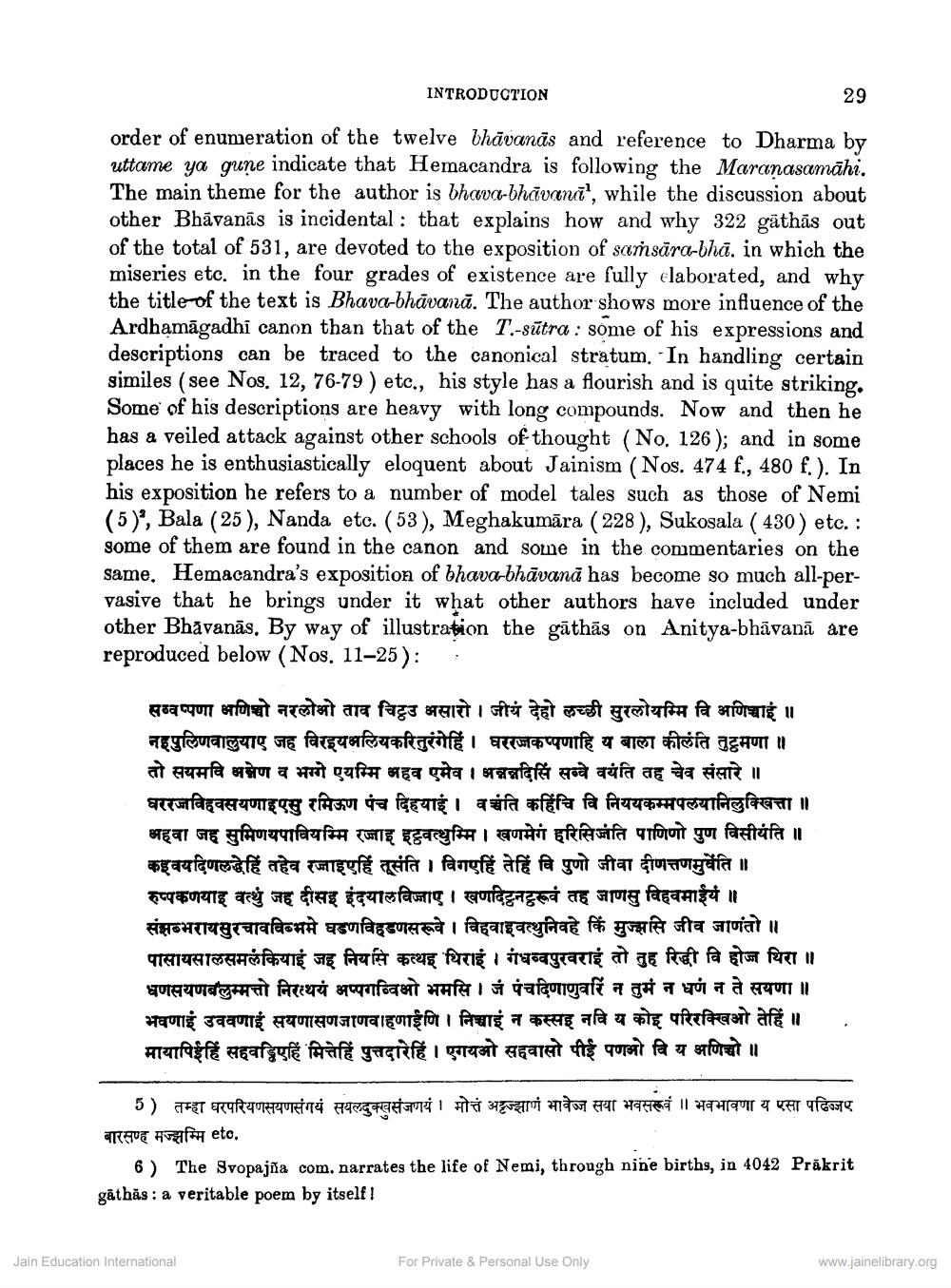________________
INTRODUCTION
29
order of enumeration of the twelve bhāvanās and reference to Dharma by uttame ya gune indicate that Hemacandra is following the Maranasamāhi. The main theme for the author is bhava-bhavan', while the discussion about other Bhāvanās is incidental : that explains how and why 322 gathās out of the total of 531, are devoted to the exposition of samsāra-bhā, in which the miseries etc. in the four grades of existence are fully elaborated, and why the title of the text is Bhava-bhāvanā. The author shows more influence of the Ardhamāgadhi canon than that of the T.-sūtra : some of his expressions and descriptions can be traced to the canonical stratum. In handling certain similes (see Nos. 12, 76-79 ) etc., his style has a flourish and is quite striking. Some of his descriptions are heavy with long compounds. Now and then he has a veiled attack against other schools of thought (No. 126); and in some places he is enthusiastically eloquent about Jainism (Nos. 474 f., 480 f.). In his exposition he refers to a number of model tales such as those of Nemi (5), Bala (25), Nanda etc. (53), Meghakumara (228), Sukosala (430) etc. : some of them are found in the canon and some in the commentaries on the same. Hemacandra's exposition of bhava-bhāvanā has become so much all-pervasive that he brings under it what other authors have included under other Bhāvanās. By way of illustration the gāthās on Anitya-bhāvanā are reproduced below (Nos. 11-25): ।
सम्वप्पणा अणिचो नरलोओ ताव चिट्ठउ असारो । जीयं देहो लच्छी सुरलोयम्मि वि अणिञ्चाई ॥ नहपुलिणवालुयाए जह विरइयमलियकरितुरंगेहिं । घरजकप्पणाहि य बाला कीलंति तुटुमणा ॥ तो सयमवि अमेण व भग्गे एयम्मि अहव एमेव । अन्ननदिसिं सब्वे वयंति तह चेव संसारे ॥ घररजविहवसयणाइएसु रमिऊण पंच दिहयाई। वचंति कहिंचि वि निययकम्मपलयानिलुक्खित्ता ॥ अहवा जह सुमिणयपावियम्मि रजाइ इट्टवत्थुम्मि । खणमेगं हरिसिजति पाणिणो पुण विसीयंति ॥ कइवयदिणलद्धेहिं तहेव रजाइएहिं तूसंति । विगएहिं तेहिं वि पुणो जीवा दीणत्तणमुवेति ॥ रुप्पकणयाइ वत्थु जह दीसइ इंदयालविजाए । खणदिटुनटुरूवं तह जाणसु विहवमाईयं ॥ संझब्भरायसुरचावविन्भमे घडणविहडणसरूवे । विहवाइवत्थुनिवहे किं मुज्झसि जीव जाणतो॥ पासायसालसमलंकियाइं जइ नियसि कत्थइ थिराई । गंधवपुरवराई तो तुह रिद्धी वि होज थिरा ॥ धणसयणबलुम्मत्तो निरस्थयं अप्पगविओ भमसि । जं पंचदिणाणुवरिं न तुमं न धणं न ते सयणा ॥ भवणाई उववणाई सयणासणजाणवाहणाईणि । निश्चाई न कस्सइ नवि य कोइ परिरक्खिओ तेहिं ॥ मायापिईहिं सहवडिएहि मित्तेहिं पुत्तदारेहिं । एगयओ सहवासो पीई पणो वि य अणियो ।
.
5) तम्हा घरपरियणसयणसंगयं सयलदुक्खसंजणयं । मोत्तं अट्टज्झाणं भावेज सया भवसरूवं । भवभावणा य एसा पढिज्जए बारसह मज्झम्मि eto.
6) The Svopajña com. narrates the life of Nemi, through nine births, in 4042 Präkrit gāthās : a veritable poem by itself!
Jain Education International
For Private & Personal Use Only
www.jainelibrary.org




